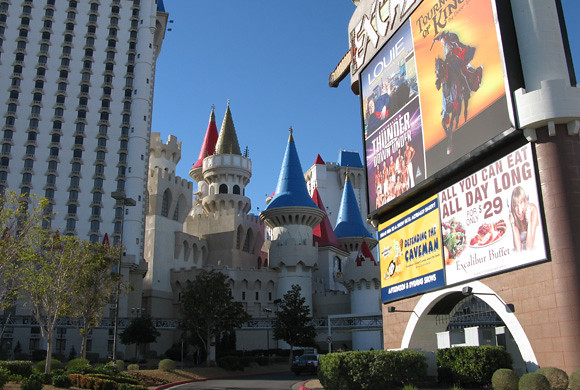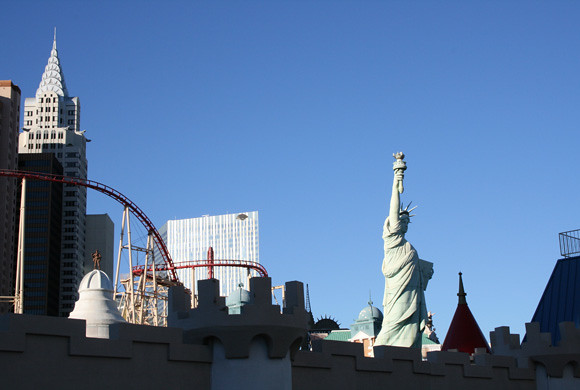A guest post by Professor Colin Fournier, contributing to the second Ecological Urbanism discussion hosted by Annick Labeca, Taneha Bacchin, DPR-Barcelona and single-blogs.
--
Although the city attracts most of our attention in the discourse on sustainability, primarily on account of the undisputable fact that it consumes 75% of the world’s energy and produces 75% of its waste, one should not lose sight of the fact that it’s very existence has always implied, by definition, the opposite of sustainability. Historically, the splitting of the city from the country was the moment when, both symbolically and materially, the culture of non-sustainability became consecrated and took off.http://www.flickr.com/photos/40984848@N04/5058192720/

Image by Colin Fournier / Las Vegas: nostalgia for the lost medieval city.
Towns and, later, cities were created as intentionally unsustainable singularities embedded within the productive landscape. They could take form in the first place - and continue to exist for centuries - only because they were supported by a vast hinterland, a "footprint" that grew larger and larger and continues to grow, almost exponentially. But is this process in itself necessarily a cause for concern? Is there not something positive about the division of labour, the splitting of roles between town and country, between built-up and non built-up land? Why do we now see so many projects - and some of them are highly sophisticated and well intentioned designs - suggesting the development of "urban agriculture" within the city fabric, i.e. the hybridising of town and country, when this amalgam is clearly not the optimal use of scarce resources, neither for the city nor from the point of view of food production?

Image by Professor CJ Lim / The Experience of Recovery.
What is of vital importance is for the whole mode of human settlement on this planet, town and country together, to become sustainable as a comprehensive system: sub-optimising any particular part individually cannot lead us to meet sustainability objectives comprehensively. The question has to be rephrased within a broader universe of discourse: it is not the sustainability of the city that we should be seeking to achieve, but that of the territory as a whole. The city alone cannot be sustainable, only the territory can. In our contemporary culture of globalisation, this territory, the relevant universe, has clearly become the planet itself, “spaceship earth”, as Buckminster Fuller already called it in the middle of last century, not some parochial segment of it, no matter how large. It is indeed not possible any longer to determine the size of the unit of space that could be considered sustainable: it is too late to do so because we are now globally connected, irrevocably.
As a result, such frequently used terms as "sustainable urbanism", "ecological urbanism", "eco-city" have become oxymorons, contradictions in terms leading to the perverse result that they may actually pre-empt the very possibility of a solution to the issues they claim to address, because the question is wrongly phrased, because the universe of discourse is wrongly defined, both conceptually and geographically. Not only do these terms give the false impression that the city could eventually, through careful design, be sustainable in itself, they also imply that cities are inevitable, that they are not only a currently predominant form of human settlement contingent on a particular set of socio-economic circumstances, but also the only possible one, the primary object to be analysed, the scene of the crime. But this is not the case: large cities have only been in existence for a relatively short period of time historically; they are a recent development dating back to the Industrial Revolution, related to very specific conditions of mass production and consumption. It is essential to look at the city as only one of several possible alternative forms of colonisation of the planet and to look carefully at these other forms of colonisation. In this respect, it may be also of considerable interest to analyse how other species have evolved to develop different kinds of habitats.

Image by Colin Fournier / Las Vegas: liberty stranded in the sum of all unsustainable cities
It could well be that, despite lingering appearances to the contrary, cities are no longer, as massive concentrations of concrete, glass and steel, the key components of our contemporary mode of settlement on this planet. As our economic system has understood and is exploiting fully, our settlements have actually shifted paradigm: their reality is constituted of interconnected networks linking such diverse elements as cities, arable land, forests, oil fields, coastal ecologies and even outer space, within a vast global system. The recent oil slick in the gulf of Mexico is as much part of the ecology of Manhattan as a traffic jam on 5th avenue, suggesting that "Global sustainability", as Fuller anticipated, may be the only relevant term to use. Global systems are made up of intersecting and reconfigurable realms of which cities are only a part, and maybe no longer the most significant part.
Believing that the city as we know it is our only possible form of human settlement, although it is possibly already in the process of shifting, leads us to perpetuate the phenomenon of rural-urban migration from which so much of the world’s problems originate, environmentally, socially and economically.

Image taken from DPR-Barcelona / Buckminster Fuller designed this tetrahedronal floating city for Tokyo bay in the 1960′s.
Believing, also, that capitalism is our only possible form of ideology and political system may be the other key obstacle preventing us from successfully achieving the goals of sustainability. This underlying political issue is seldom raised by designers and urbanists, although it is clear that while sustainability requires long term planning in the interest of society as a whole, the ideology of capitalism, at least in its pure form, encourages short term profits in the interest of the few, irrespective of the resultant social, economic and environmental damage to our planet. This fundamental divergence of goals raises the key question of whether sustainability can ever be achieved under capitalism as we know it or whether a profound mutation of our political system would be needed, both in terms of its underlying ideology and in terms of its praxis. Since it has shown so far a remarkable ability to survive and recuperate dissent, capitalism will most probably find ways of adjusting to the different set of goals required by the search for sustainability: it is already changing, to ensure its own sustainability, but will these adjustments be sufficient?
--
Prof. Colin Fournier is Director of the MArch course in Urban Design at the Bartlett School of Architecture, UCL, University College London. He joined UCL in 1996, where he has also been directing a Diploma unit. He is the co-designer, with his partner Peter Cook, of the new museum of modern art of the city of Graz, Austria. He was Bernard Tschumi´s partner for the planning and design of the Parc de la Villette project in Paris and was the former Planning Director of Ralph M. Parsons Co. in the USA, in which capacity he planned and implemented several major new town projects and comprehensive development programmes.
Tidak ada komentar:
Posting Komentar